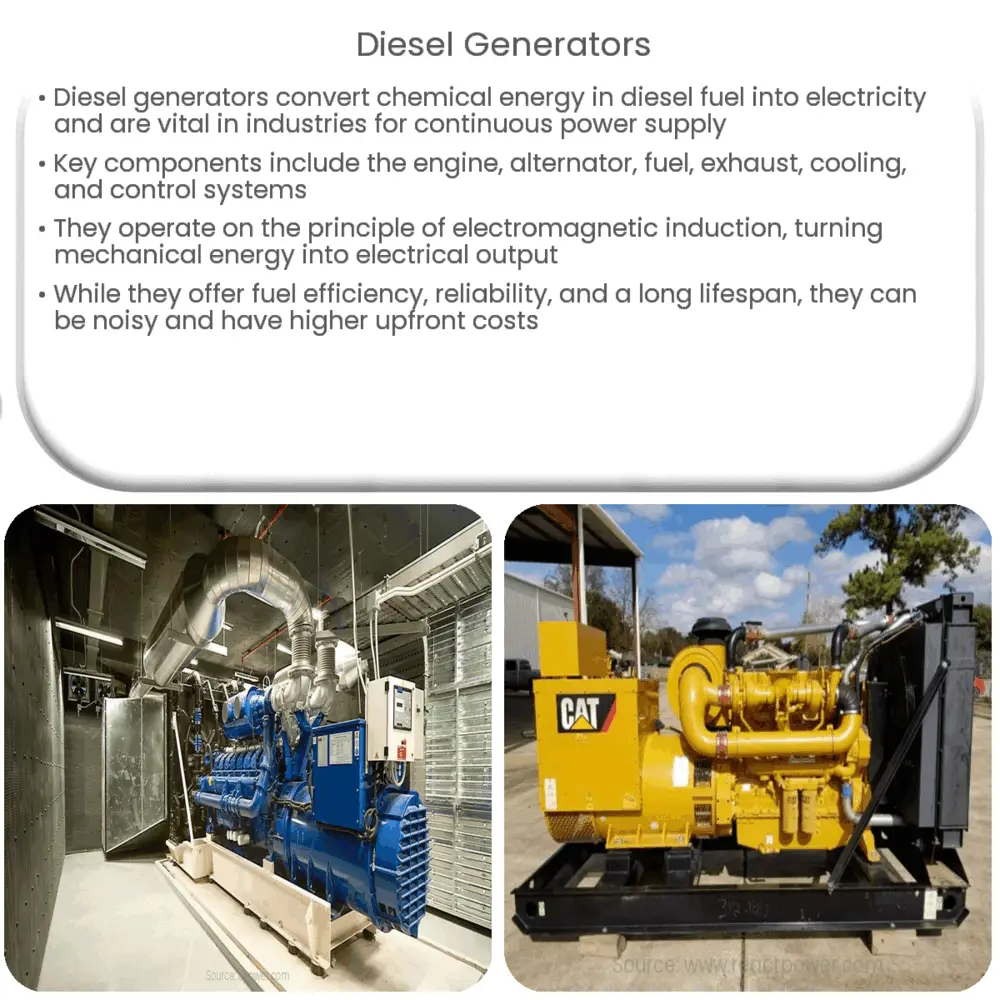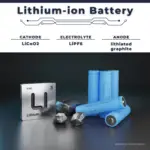Explore the working principle, components, advantages, and disadvantages of diesel generators in our comprehensive guide.

Understanding Diesel Generators
Diesel generators, as their name implies, utilize diesel fuel to generate electricity. They are a key component in numerous industries, offering a reliable source of power during blackouts or in areas where the electric grid is unavailable. They are extensively used in hospitals, data centers, construction sites, marine vessels, and residential buildings, to name a few.
The Core Components of a Diesel Generator
- Engine: The engine is the heart of the diesel generator. The size of the engine determines the amount of power the generator can produce.
- Alternator: Also referred to as the ‘genhead’, the alternator converts mechanical energy from the engine into electrical energy.
- Fuel System: This system stores and supplies diesel to the engine. It includes the fuel tank, pipes, filters, and injectors.
- Exhaust System: The exhaust system removes the combustion by-products produced when the generator is running.
- Cooling and Ventilation Systems: These systems prevent the generator from overheating by ensuring optimal working temperature.
- Battery Charger: The battery charger ensures that the battery is always charged to start the generator.
- Control Panel: The control panel acts as the generator’s brain, allowing you to monitor and control generator functions.
The Working Principle of Diesel Generators
The basic working principle of a diesel generator is based on the law of electromagnetic induction, which states that an electric current is induced in a conductor when it is moved within a magnetic field. Here’s how a typical diesel generator works:
- The process begins when the diesel engine consumes diesel fuel to produce mechanical energy.
- This mechanical energy is then used to rotate a magnet inside the alternator.
- As the magnet moves within the conductive wires of the alternator, it induces an electric current.
- This current is then transformed into a usable form of electricity, which can power electrical devices and systems.
In a nutshell, a diesel generator converts the chemical energy stored in diesel fuel into mechanical energy, which is then converted into electrical energy. The overall efficiency of this process, along with the generator’s performance and longevity, greatly depends on the maintenance and operation practices implemented by the user.
Advantages and Disadvantages of Diesel Generators
Like any technology, diesel generators come with their own set of advantages and disadvantages:
Advantages
- Fuel Efficiency: Diesel engines have a higher energy density, meaning they provide more power per liter of fuel compared to other types of generators.
- Reliability: Diesel generators are known for their durability and reliability. They can operate for longer periods and require less maintenance.
- Long Lifespan: If properly maintained, diesel generators can last for several decades, making them a cost-effective long-term investment.
- Availability of Fuel: Diesel fuel is readily available globally, making diesel generators a viable solution in remote locations.
Disadvantages
- Noisy Operation: Diesel generators can be relatively loud, which might be an issue in residential areas or other noise-sensitive environments.
- Emission: Diesel generators produce emissions, contributing to air pollution. However, modern generators are equipped with technologies to reduce these emissions.
- Higher Initial Cost: While they are cost-effective in the long run, diesel generators have a higher upfront cost compared to other types of generators.
Conclusion
Diesel generators play a critical role in ensuring a continuous supply of power in a variety of applications, from powering vital hospital equipment to maintaining operations at remote construction sites. Despite certain drawbacks, their reliability, efficiency, and long lifespan make them a popular choice. As technology continues to advance, it is expected that improvements will further increase the efficiency of diesel generators and reduce their environmental impact. Choosing the right generator involves carefully considering your specific needs, the environment in which the generator will operate, and the total cost of ownership. As such, diesel generators remain a worthwhile investment for many businesses and individuals worldwide.



